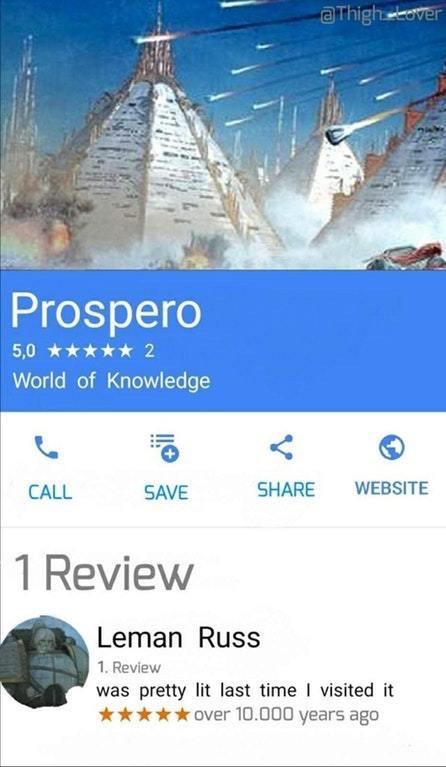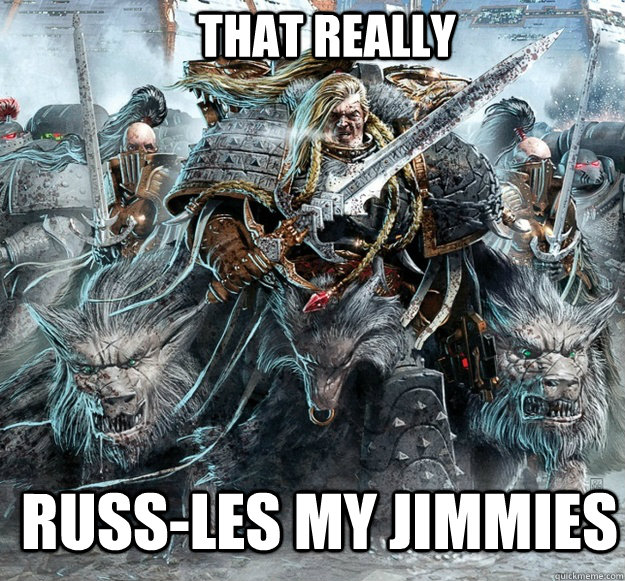I was told that A Thousand Sons by Graham McNeill and Prospero Burns by Dan Abnett were both about the same event but from the point of view of each Legion. ATS (obviously) from the point of view of the Thousand Sons and PB from the view of the Space Wolves. I thought I needed both in my knowledge bank for Ashes of Prospero. I definitely needed the first book, but not really the second to follow along with AoP. It’s not because PB is a retelling of the pivotal battle between Magnus and Leman Russ from a different point of view.
In fact, I’d argue that it’s really not a retelling. Prospero Burns is a glimpse into the life and culture on Fenris, both within the Space Wolves and without. The reader starts off having absolutely no clue what is going on, and it’s only near the end that everything slides into place. That’s pretty much the Space Wolves in a nutshell. You have no idea what is going on with them, they aren’t going to tell you, and it’s much later that suddenly everything they do makes sense. The book structure reminded me a lot of To Kill a Mockingbird, one of my favorite books. I wholeheartedly admit that comparison affected my rating on Goodreads.
However, as brilliantly as Dan Abnett compiled it, Prospero Burns left me with more questions and answers. Whereas I completely understood why—now on so many levels why—the Space Wolves didn’t trust the Thousand Sons, I still didn’t understand why the Space Wolves felt justified in what they had done.

Kasper Hauser Account
For a Legion that doesn’t like secrets, they sure aren’t big on explaining anything. They were happy to share stories to be sure, which is why they had skjalds like Kasper around. But then again these stories could only be shared with other Wolves, hence why they wouldn’t let Kasper record anything or write anything down. Can’t let some non-Wolf see what goes on with the Wolves, after all.
But if Kasper tried to ask about anything, none of the Wolves were willing to share. On the same token, when Kasper asked a question about what he should do in this situation or that situation, the Wolves would be incredibly irritated with him for not automatically knowing. I was so frustrated on Kasper’s behalf. I would have been rather snappy and snarly with the Wolves, which would have either gotten me gutted or elevated to favorite outsider, depending upon who I snapped at.
Which I suppose is why Leman Russ literally buried Kasper after he told his final account of the war on Prospero. It was a big story, that explained how the Primordial Annihilator was behind, well, everything. It planted Kasper as a spy and it left clues to make the Wolves think the Sons planted him. It got Erebus to turn Horus against the Emperor. It wanted the Wolves and Sons to destroy one another completely. Even though it wasn’t 100% successful, as the Wolves live, it now has the Sons under its purview.
Kasper told this story to all of the Wolves. And somehow, the present-day Wolves know nothing about it. Either Kasper never did tell his account, or Leman Russ ordered everyone to forget it upon penalty of death. If it’s the latter, I’m not sure why. Wouldn’t Russ take some solace in that he was played by the Primordial Annihilator and not simply lied to by his brother? Or maybe go run and tell Dad what Kasper learned?
Or did Leman Russ decide that Kasper was too compromised by the Primordial Annihilator to be trusted fully? Perhaps his account was flawed from the get-go? That’s half of why Russ buried him in stasis. Did Russ not believe in the tales of the Primordial Annihilator at all, and he still believed the Sons were behind it all?
See? More questions than answers, and I’m sure that’s exactly how the Space Wolves like it.
Softer Side of Russ

Even though Prospero Burns was hardly about the war on Prospero and barely took place on the planet, therefore not really telling a new side to the story, it did show one thing new that I really needed. The only true retelling of these events from the view of the Wolves was during the Council of Nikaea. It was this scene that showed me two things I did not expect: a kinder Fulgrim and the soft side of Russ (and I don’t mean the pelts he wears).
The gruff, barbarian attitude is (mostly) a bluff, how he acts because it’s how people expect him to act. He really does care about Magnus and wants to help him, but unfortunately this Council isn’t going to be the best way to do it.
Although, would anything have stopped Magnus? I already said from the last book that his biggest problem, and thus his downfall, was hubris. Since he’s smart and he KNOWS he’s smart, is he going to listen to anyone? He already thinks that he’s surpassed his father. He thinks the Wolves are idiots who don’t know what they’re talking about. It’s not until the damage has been done that he sees the errors of his ways at all.
It wouldn’t matter how soft and kind Russ was to him. He wouldn’t have listened because he knows more than anyone. Knowing is far more important than asking what you should know.
However, I needed to see that side of Russ. I needed to see that he wasn’t a complete asshole barbarian. All Thousand Sons fans need and needed to see it. Even though Russ believes that there’s a thing with learning too much, but in this case, I needed the whole picture, to see where both sides were coming from and how they truly felt. It makes it all far more tragic in the end.
Although I still strongly dislike Ohthere Wyrdmake. That probably won’t change.
Nine books down, 45 to go. Yes, I still need to read books 8-11 and also 13-14. Those are after the next one I read out of order.
Horus Hearsay is dedicated to Keri’s journey through the Horus Heresy saga. The chronicling of the Horus Heresy began over ten years ago, with currently 54 books in total, not counting The Primarchs series or the various short stories. Horus Hearsay will only cover the main novels.
A very fair overview. It’s nice to see someone not try to defend Magnus’s beliefs, not because Russ was a viewed as a brute, but because Magnus wouldn’t have listened even if Russ wasn’t.
I’m surprised you didn’t make a fuss about the book’s two most polarizing pieces. Presenting the Wolves as the Emperor’s Executioners (more recent lore has given better context), and the whole “There are No Wolves on Fenris,” both of which have been meme’d to death.
Good pick-up on Russ’s barbarism being mostly fake. There is a fascinating dichotomy presented with Russ and the Lion, and not the one you’re probably thinking of. Russ was cultured, but grew up to command savages. The Lion was savage, raised in the wilds of Caliban, but grew up to command a culture. Each had to put on the opposite mask when dealing with their legion and their people.
A bits of additional context:
The alternative title for Prospero Burns was “Wolves of Fenris”, which apparently everyone behind the scenes EXCEPT Dan Abnett thought was a better title, but Dan got his way.
Dan Abnett was recovering from severe epilepsy during the writing of this book, leading to many starts and stops and rewrites. It was intended to be released right after A Thousand Sons, but Dan’s health condition lead to the book being pushed back in the series.
I knew the latter part. It was in Dan’s afterward of my copy.
As for the polarizing pieces, I’ve heard them from Jen for a looooong time. ☺️